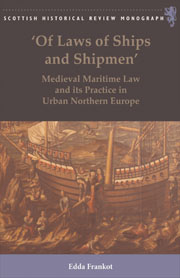Book contents
- Frontmatter
- Contents
- Tables and Maps
- Abbreviations
- Acknowledgements
- Preface
- Introduction
- 1 A History of Maritime Law in Northern Europe
- 2 Shipwreck, Jettison and Ship Collision in Maritime Law
- 3 The Five Towns Introduced
- 4 Written Law: Urban Collections of Sea Law
- 5 Written Law: Local Developments in Lawmaking
- 6 Legal Practice: the Administration of Maritime Justice
- 7 Legal Practice: Maritime Proceedings at the Urban Courts
- Final Conclusions
- Bibliography
- Index
Introduction
Published online by Cambridge University Press: 05 August 2013
- Frontmatter
- Contents
- Tables and Maps
- Abbreviations
- Acknowledgements
- Preface
- Introduction
- 1 A History of Maritime Law in Northern Europe
- 2 Shipwreck, Jettison and Ship Collision in Maritime Law
- 3 The Five Towns Introduced
- 4 Written Law: Urban Collections of Sea Law
- 5 Written Law: Local Developments in Lawmaking
- 6 Legal Practice: the Administration of Maritime Justice
- 7 Legal Practice: Maritime Proceedings at the Urban Courts
- Final Conclusions
- Bibliography
- Index
Summary
The topic of medieval maritime law has attracted increasing interest in the past three decades. It is, however, a theme that deserves much more attention in this age of Europeanisation and internationalisation. Because maritime law regulates sea shipping, which connects different ‘nations’, it is intrinsically international or supranational. Or is it? The existence of a common maritime law in northern Europe has regularly been presumed, but has never been proven. For example, it is often supposed that the Rôles d'Oléron were generally used throughout northern Europe or, at least, that they formed the basis for other northern European sea laws. The Wisby or Gotland Sea Laws are also sometimes named as having been used throughout the area. A few years ago Albrecht Cordes raised doubts as regards the existence of a medieval lex mercatoria as a fixed common law regulating trade throughout northern Europe. Such doubts extend to maritime law too. The existence of several local sea laws (for example from Hamburg, Kampen, Lübeck, Riga and Wisby) rather suggests that a common maritime law did not exist in medieval northern Europe. Indeed, those authors who have undertaken detailed research into the matter have stressed the importance of certain written laws and the dissemination of copies of these laws throughout the area, rather than their adoption or usage in all sea ports bordering the North and Baltic Seas.
- Type
- Chapter
- Information
- Of Laws of Ships and ShipmenMedieval Maritime Law and its Practice in Urban Northern Europe, pp. 1 - 5Publisher: Edinburgh University PressPrint publication year: 2012

